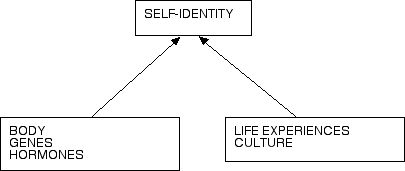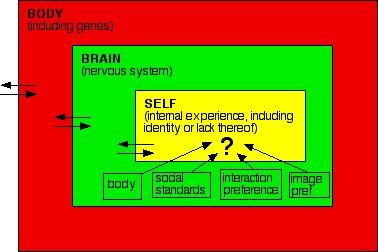Does Biology Have Anything to Contribute to Thinking About Sex and Gender?
PG:
Biology (like all science) doesn't answer questions (or solve problems) but it may (depending on one's degree of familiarity with it and other aspirations/commitments) provide observations and perspectives that are novel and useful for developing improved stories about particular phenomena (including sex and gender?). As is the case with all story-generating systems, biology (and science) creates risks as well as benefits in this regard. Appropriately used, perhaps it can contribute to counteracting "existing systemic violence"? Remember, at all times, that science is not about about "Truth" or "facts", it is about observations and stories that summarize them in an assailable way and, in so doing, suggest new ways of thinking about things and raise new questions.
Some relevant areas re "sex and gender":
| Did "material body" etc and some of "development" on Tuesday. Today quick review and then on to evolution ... and "perhaps it can contribute ..."?
|
Evolution
Genesis
Material body
- Appearance/function
- Brain
- Self
- Cultural influences
Thinking about body/culture/self ...
| A starting place | Adding a biological perspective |
|---|
sex = biology
gender = culture
identity = ?
| 
| "culture" is not independent of "biology" nor "biology" of "culture"
"self" is influenced by both and is a contributor to both
both "sex" AND "gender" are "social constructs"; so too are both "biology" and "culture"
|
Applying the story to individuals ...
From Jenny Boylan:
- "plumbing and electricity work fine"
- "enlarged bed nucleus of stria terminalis"
- "knew from inside that I was a girl"
- "gender preference" ... "gender identity" ... ?
Relevant to one's own story: there seem to be at least four signals from presumably four different brain regions that may be but are not necessarily congruent with one another
Questions that arise:
- what/where are the brain regions? is there a "social standards" brain region? how does it work? can one explore "culture" in the brain?
- what/where is a "self" brain region? how are inputs adjudicated there?
- what in terms of neurons is a tolerable mismatch? one that requires action?
- given variability in brains, why is "culture" so concerned with binaries? can that be changed? how? .... issue of "social construction"
How do things get the way they are? Genes AND other things ...
- Virtually all behavior is influenced by genes.
- Virtually no behavior is determined by genes.
Multiple steps between genotype and phenotype
Complex interactions among genes
Role of environment - ALWAYS "yet to be determined"
Role of chance
Role of "self" - ALWAYS "yet to be determined"
A specific case: homosexuality
- Concordance among identical twins is high but not 100%
- there is no "gay" gene, or even a determining set of genes
- there is reasonable explanation for "I always knew it, from inside"
- there is reasonable explanation for homosexuality being a characteristic difficult to alter
- new observations/stories CAN be be useful, but also carry hazards ...
- why should homosexuality (or other variants) be treated as a target for alteration?
- "social construction" of homosexuality? (or transsexuality or ... )?
Why are there variants?
| Social construction | Biological observations/story |
|---|
| Nature is imperfect, needs to be put "right" by human beings Social coherence requires individuals to be shaped to fit culture
Sex is for reproduction The objective is reproductive success
| Humans are one small part of a large and continuing exploration of possibilities So too is are human cultures
Sex facilitates exploration The objective is exploration
|
The story of evolution
- Continuous and unending change
- Driven form inside as well as from outside
- No measure of "success" other than existence
- At any given time, lots of DIFFERENT "successes"
- Future emerges unpredictably from pool of "successes" of present
The story of sex
- Sex and reproduction are not the same thing
- Reproduction without sex - mitosis, plants
- Sex without reproduction - bacteria and ...
- Function of sex is ... to enhance exploration/discovery?
- Bacteria, viruses
- Meiosis and fertilization
- The human exploration
- Genome played on by internal environment played on by external environment played on by personal choice
- Independent variation of body, several brain regions
- Creation of multiple "sexes/genders"
- "Success" to date and exploration in progress .... new forms of culture?
- Multiple sexes/genders is to be appreciated/enjoyed for what it can/may create rather than to be worried about/winnowed as threatening/disruptive
Does biology have anything to contribute to thinking about sex and gender ... revisited
Yes ... if biology (and science) are treated as a body of observations and of assailable public stories deriving from those observations that are told by humans and offered for whatever use they might be in an ongoing exploration of possibilities
- Depends on scientists being careful about what they do and how they talk about what they are doing but NOT on scientists avoiding any personal engagements/commitments relevant to what they are doing
- Depends on everybody treating science not as "Truth" or "fact" but as what it is, and exercising the same critical judgements re "science" as should be exercised re anything else
- Re Levay in general:
- collecting observations always useful, benefits clear for himself and others wrt correcting some "social constructions", risks have to do not with observations collected nor his story of them but with other "social constructions".
- Levay himself certainly motivated by his own interests, NOT so far as I know by an interest in stamping out homosexuality.
- Re Levay in particular:
- Re textbooks:
- Re Jennifer Terry, An American Obsession ...
- "If we continue to look to science and medicine at all, perhaps it should be to investigate how we might all consist of recombinant elements that make the binary face-off between homosexuality and heterosexuality a thing of the past"
- Here, here ... and (re
"at all") it would be a shame if one withdrew from science, both in terms of the cost to one's own ongoing explorations and in terms of the lost opportunity to play a role in an enormously powerful and effective way to explore/discover/create new things collectively
Might in fact be a way of counteracting "existing systemic violence" not only re homosexuality, and re sex/gender variation in general but also re the whole host of other forms of oppressive "hierarchy"?
Thanks to all for contributions to this particular story. Would love to know what you think of it, have you assail it and/or contribute to its further development. One last set of thoughts in the on-line forum, please?
| Science in Culture
| Serendip Home |
Send us your comments at Serendip

© by Serendip 1994-
- Last Modified:
Wednesday, 02-May-2018 10:51:31 CDT


